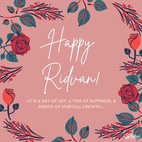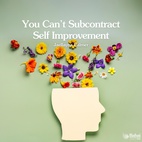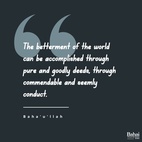The views expressed in our content reflect individual perspectives and do not represent the official views of the Baha'i Faith.
John Stuart Mill, one of the most important 19th century philosophers, believed “that the greatest happiness of the greatest number should be the guiding principle of conduct.”
Mill’s idea has since become the basic mantra of social democracy.
Unfortunately, though, since the 19th century capitalism, liberalism and communism have all managed to produce a great deal of unhappiness, while at the same time failing to prevent the development of rampant corruption. This opens the door once again to fascism, which feeds on unhappiness and discontent and leads to enslavement of the body, mind and soul.
In this sense we might heed Mill’s warning that: “Bad men need nothing more to compass their ends, than that good men should look on and do nothing.”
Stepping back a little in time, learning from the philosophy of Immanuel Kant who had no time for utilitarianism, we can begin to see the big picture a little more clearly. He thought that placing the emphasis on human happiness completely misunderstood the nature of morality.
In Kant’s view, the basis for our sense of good or bad, right or wrong, hinges on our awareness that human beings are free, rational agents who should be given the respect appropriate to such beings. Kant believed that through democracy, and cooperation between nations, everlasting peace not only could be achieved—but is inevitable. He said: “through democracy, (human rights) and cooperation between nations, everlasting peace not only (can) be achieved but (is) inevitable.”
However, since his time democracy and human rights have been hampered from fully developing, and have yet to prove themselves to be effective globally, as just laws are still far from being universally applied.
The Baha’i teachings declare that a true, lasting universal peace can only be properly achieved in true faith by setting up an inviolable, universal covenant that extends to the whole of humanity based on world citizenship, a truly representative world government, and a system of global justice. The Baha’i vision of that inevitable future state of society transcends current religious ideas, cultural perspectives, politics and economics, produces prosperity for all, and protects and safeguards the environment. In order to achieve such a state of affairs, however, it requires real faith—not only in God but in a common acceptance of the organic oneness of humanity, which can only spring from universal love.
From this same basic perspective, Soren Kierkegaard, a 19th century existential philosopher, stated that the knight of faith is a person who places complete faith in himself and in God:
… when the heart is filled with love, then the eye is never deceived; for love when it gives, does not scrutinize the gift, but its eye is fixed on the Lord. When the heart is filled with envy, then the eye has power to call forth uncleanness even in the pure; but when love dwells in the heart, then the eye has the power to foster the good in the unclean; but this eye does not see the evil but the pure, which it loves and encourages it by loving it. Certainly there is a power in this world which by its words turns good into evil, put there is a power above which turns the evil into good; that power is the love which covers a multitude of sins.
This resonates well with the Baha’i perspective. In the words of Abdu’l-Baha:
… consider the material progress of man … schools, colleges, hospitals, philanthropic institutions, scientific academies, temples of philosophy have been founded, but hand in hand with these evidences of development, the invention and production of means and weapons for human destruction have correspondingly increased. – The Promulgation of Universal Peace, pp. 109-110.
Another integral Baha’i principle—the complete equality of women and men—will help drive our progress toward a peaceful world. Simone de Beauvoir, one of the most influential female philosophers of the 20th century, expressed that principle with great feeling:
On the day when it will be possible for woman to love not in her weakness but in her strength, not to escape herself but to find herself, not to abase herself but to assert herself—on that day love will become for her, as for man, a source of life and not of mortal danger.
In this quest for peace, recognition of the true source of life brings back a sense of awe. As diverse as our philosophical ideas can be, one force burns more brightly in our midst, transcends all of our individual thoughts, philosophical ponderings, dreams, hopes and ambitions, plans and actions and leads us to a more transcendent state—the power of prayer and meditation, which recognizes the true nature of humanity and which acts like a natural fuel for the human spirit:
I know not, O my God, what the Fire is which Thou didst kindle in Thy land. Earth can never cloud its splendor, nor water quench its flame. All the peoples of the world are powerless to resist its force. Great is the blessedness of him that hath drawn nigh unto it, and heard its roaring. – Baha’u’llah, Baha’i Prayers, p. 51.

















Comments
Sign in or create an account
Continue with Facebookor